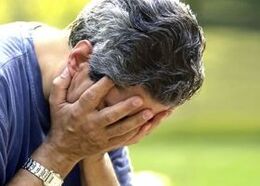
Men, like women, have their fears. Women are afraid of losing their beauty and becoming unattractive, and men are afraid of feeling their masculine failure. When a man is diagnosed with prostatitis, he immediately has panic and fear of losing his masculine power, and sometimes it would be helpful for a man to visit a psychologist along with a urologist.
Prostatitis is an inflammatory disease of the prostate (prostate). This organ, similar in shape and size to a chestnut, is located directly below the bladder and produces seminal fluid, which is involved in sperm transfer. But the whole problem is that the same organ (urethra) performs two functions at the same time, both as a urethra and as a conductor of seminal fluid. With inflammation of the prostate, both functions begin to suffer, this is the complexity of the development and treatment of prostatitis. For women, in this aspect, everything is much simpler, as these functions are separate for them.
signs of prostatitis
The National American Institute of Health divides prostatitis into four categories:
- acute bacterial prostatitis
- chronic prostatitis
- abacterial prostatitis
- asymptomatic prostatitis
The symptoms and signs of prostatitis differ depending on the category.
Acute bacterial prostatitis is acute and has the following symptoms:
- flu-like symptoms
- chills and fever
- groin, lower back, and prostate pain
- frequent urge to urinate
- pain when urinating and blood in the urine
- painful ejaculation
With these signs, you should call an ambulance or immediately consult a doctor.
Chronic bacterial prostatitis does not develop as acutely as the first type of prostatitis. Symptoms develop more gradually, the course of the disease occurs in waves, that is, periods of calm are replaced by exacerbations.
Symptoms of Chronic Prostatitis:
- burning and pain when urinating
- frequent urge to urinate, especially at night
- pain in the pelvis, lower back, and genitals
- recurrent cystitis
Chronic abacterial prostatitis is very similar in symptoms to bacterial prostatitis, but most often occurs without fevers and acute exacerbations. It is possible to distinguish bacterial from abacterial prostatitis only by carrying out special laboratory tests.
The symptoms and signs of prostatitis are similar to many other diseases.
Causes of prostatitis
The main cause of prostatitis is a bacteria found in the large intestine. The infection begins to develop directly in the prostate, but sometimes it also happens that it enters the prostate from the bladder or urethra. Chronic bacterial prostatitis can develop after acute prostatitis or it can appear due to infections of other organs that can serve as a source of infection.
The causes of chronic abacterial prostatitis are not fully understood, at the moment several causes and theories of the occurrence of this disease have been put forward:
- lifting heavy objects can cause illness if weights are lifted when the bladder is full, as a result of which urine can be thrown into the prostate, causing an inflammatory disease;
- pelvic muscle spasm or anatomical disorders of the genitourinary tract can also lead to inflammation;
- interstitial cystitis, which, despite being a predominantly female disease, can also occur in men;
These are the main symptoms, signs and causes of prostatitis. Prostatitis is not a contact disease and is not sexually transmitted.
how to cure prostatitis
Treatment in this case can only be prescribed by a doctor after diagnosis. Do not heed the advice of friends who offer to experience the means by which they have been healed. Medications for prostatitis are prescribed individually. With prostatitis of the first and second categories, antibiotics are used, physical therapy, baths and massages are prescribed. Sometimes, although in rare cases, surgery may be necessary.
So that prostatitis does not enter your life, you need to lead a correct and healthy lifestyle and, in addition, a regular sex life (not forgetting about the means of protection and protection). Drinking coffee, cigarettes and spicy foods should be kept to a minimum. Also, you need to drink a lot of water, not forgetting to empty your bladder regularly and at the right time. Any disease is easier to prevent than to treat.





























